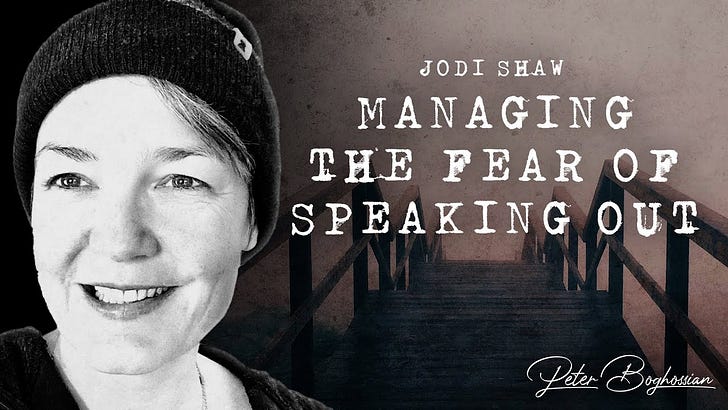In this week’s three part series, we are delighted to share Jodi Shaw’s perspective on confronting ideological orthodoxy in the workplace.
Jodi is a musical artist and reluctant activist who blew the whistle on the racially hostile and discriminatory work environment she encountered at Smith College in a series of YouTube videos. In December of 2021, Jodi (also an alum of Smith) filed a federal lawsuit against the college in U.S District Court for the District of Massachusetts.
Jodi now writes a Substack, Diary of a Dissident.
Without further ado, here’s Jodi’s guest post and the first video in the series.
Waking up to Woke by Jodi Shaw
It’s almost cliche to say that when injustice arrives, people do not act to intervene until it affects them personally. I’m not exceptional in that regard. Although something about the administration’s extreme preoccupation with race felt wrong from the beginning, I could not put my finger on how or why.
At Smith, phrases like “social justice,” “systemic racism,” and “equity” were bandied about with the casual arrogance of a naked emperor. They were never defined; it was assumed that everyone knew what they meant. I myself did not fully understand what the administration meant by “systemic racism” for example, in large part because whenever anyone took the time to explain it to me, it seemed so illogical I assumed I must be misunderstanding it. The blind acceptance of such a premise by my colleagues only served to amplify this feeling.
Also, I have to confess I was not paying a whole lot of attention. I was more excited about my new job, my new house (which felt like a mansion compared to the postage stamp I had occupied in New York City), and the fact that getting my kids around town no longer resembled organizing a military campaign.
So, I went along with it for a while. I attended discussions where—over turkey wraps catered by Smith Dining Services—my white colleagues listed all the ways they perpetuate racism simply by being white. I heard colleagues “of color” decry the oppression they suffered at places like Smith, one of the most prestigious institutions in the world.
That these discussions felt contrived certainly bothered me, but I could not ascertain what was substantively wrong with them. Nor did I have any incentive to do so. In fact, I had incentive not to. And that was part of the problem.
It was not until after several months of increasing pressure to behave in ways I found morally and legally questionable that I began—in earnest—the process of trying to figure out what the hell was going on.
To do so, I had to explain, in my own words (to myself, before I could explain to anyone else) how such a confounding, nonsensical belief system had come to capture so many hearts and minds, including my own. To do this, I had to take a good look at myself. How had I been captured? How is it that this is the only acceptable version of reality? What does “social justice” mean, exactly? And how will we when we have achieved it? Am I secretly a racist? Why does it feel so dangerous to question this belief system? And why is nobody else saying anything?
I am not an academic, nor am I a political person. My framework for understanding Smith’s obsession with race is not rooted in an intellectual or socio-political analysis. I did not know a lot about Critical Race Theory (CRT) or “Equity.” (As it turned out, neither did the head of Smith’s Inclusion and Equity Department).
As it turns out however, I didn’t need to understand the theoretical underpinnings of CRT; I could see with my own eyes the catastrophic outcomes that resulted from its clumsy deployment. And in the end, it came down to a simple cost-benefit analysis: I decided that the psychic damage I was experiencing as a result of my complicity was greater than any possible damage I might suffer as a result of speaking up. In the end, it took me two years of agonizing self-doubt, confusion, frustration, and exhaustion before I finally spoke up.
As someone who considers herself intellectually smart and street smart, armed with an excellent bullshit detector, it wasn’t easy for me to acknowledge that I had been duped. I had to reconcile that I had not only accepted the dominant messaging and behavior, I had in many ways actively participated in it. As such, I had been a bystander to one of the biggest abuses of power I have even been privy to in my life.
I am not a bystander anymore.
Will I win my lawsuit? Will I ever have a “normal” life again? These are things that remain to be seen.
The only thing I know for sure is that I will live out the rest of my life, integrity intact. Most importantly, my two sons will grow up knowing that the woman who raised them did not stand by silently while their civil rights were trampled. That their mother was not a coward; that she cared more about their future than she cared about being liked by her peers. And in the end, that is all that really matters.



Jodi I so admire you for standing up and speaking truth. People today like to say "your truth" or "my truth." Sorry, but there's a broad category of reality where truth can neither be constructed or deconstructed, it's just truth. I'm only one persons but there are millions of us out here who are behind you 1000%.
- It’s almost cliche to say that when injustice arrives, people do not act to intervene until it affects them personally.
- And then they came for me